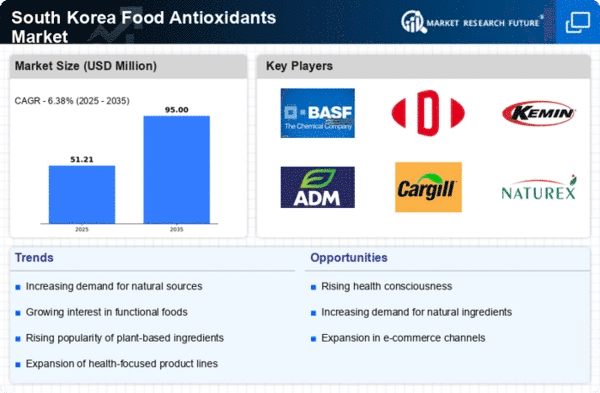Regulatory Support for Food Safety
Regulatory frameworks in South Korea are increasingly emphasizing food safety and quality, which may significantly impact the food antioxidants market. The government has implemented stringent regulations regarding food additives and preservatives, leading to a heightened interest in natural alternatives. Antioxidants derived from natural sources are often viewed as safer and healthier options compared to synthetic additives. This regulatory environment encourages food manufacturers to explore and incorporate natural antioxidants into their products, thereby expanding the food antioxidants market. As a result, the market is likely to witness a surge in demand for products that comply with these regulations, fostering innovation and growth within the sector.
Health Consciousness Among Consumers
The increasing health consciousness among consumers in South Korea appears to be a primary driver for the food antioxidants market. As individuals become more aware of the health benefits associated with antioxidants, such as their role in reducing oxidative stress and preventing chronic diseases, the demand for antioxidant-rich food products is likely to rise. According to recent surveys, approximately 70% of South Koreans express a preference for foods that promote health and wellness. This trend is reflected in the growing market for functional foods, which often incorporate natural antioxidants. The food antioxidants market is thus positioned to benefit from this shift in consumer preferences, as manufacturers respond by developing innovative products that cater to health-oriented consumers.
Growing Interest in Plant-Based Diets
The rising interest in plant-based diets among South Koreans is emerging as a significant driver for the food antioxidants market. As more individuals adopt vegetarian or vegan lifestyles, the demand for plant-derived antioxidants is likely to increase. Foods such as fruits, vegetables, nuts, and seeds are rich in natural antioxidants and are becoming staples in many households. This shift towards plant-based eating aligns with broader health trends, as consumers seek to improve their overall well-being. The food antioxidants market is expected to benefit from this trend, as manufacturers develop products that cater to the growing population of health-conscious, plant-based consumers.
Rising Popularity of Functional Beverages
The trend towards functional beverages in South Korea is emerging as a notable driver for the food antioxidants market. Consumers are increasingly seeking drinks that offer health benefits beyond basic nutrition, such as enhanced immunity and improved cognitive function. This shift is reflected in the growing sales of antioxidant-rich beverages, including teas, juices, and smoothies. Market data indicates that the functional beverage segment is projected to grow at a CAGR of 8% over the next five years. The food antioxidants market is likely to capitalize on this trend by providing ingredients that enhance the nutritional profile of these beverages, thus appealing to health-conscious consumers.
Innovation in Food Processing Technologies
Advancements in food processing technologies are playing a crucial role in shaping the food antioxidants market. Innovative extraction and preservation methods allow for the efficient incorporation of antioxidants into various food products without compromising their quality. Techniques such as high-pressure processing and microencapsulation are gaining traction, enabling manufacturers to enhance the stability and bioavailability of antioxidants. This technological progress is likely to drive the food antioxidants market forward, as it facilitates the development of new products that meet consumer demands for health and convenience. As a result, the market may experience increased competition and a wider array of offerings.



















Leave a Comment